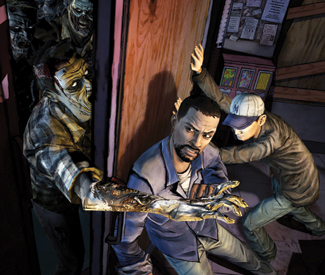arts@sfbg.com
YEAR IN GAMER It was a good year for gaming. You may not have realized it, with fewer marquee titles than last year’s three-mageddon of Resistance 3, Gears of War 3, Battlefield 3, and Modern Warfare 3 in a span of two months, and with no sign of the long-rumored and eagerly-anticipated new PlayStation and Xbox consoles. But this year was actually an embarrassment of riches for gamers who were willing to buck the franchise bug and try something new, suggesting that developing games for a generation of flagging consoles doesn’t have to be an exercise in repetition and sequel-itis. Instead, it provides an incentive for developers to get a little creative.
Tell me a story The surprise success of 2012 was The Walking Dead (Telltale Games), a game that’s a series of shorter “episodes” in which you play as Lee, an escaped convict in a zombie-occupied Atlanta. But the real heart of the experience is in developing who Lee is for yourself. Sure, the game often decides what your character does and where he goes, but you are given the tools that shape his motivations for why.
In my play-through, Lee made many decisions I would describe as “good,” but the options were never black or white. I helped form a back story that had Lee helping others to survive the zombie apocalypse in order to alleviate guilt for his wrongdoings. Each choice you make, no matter how superficial or comparatively insignificant, strengthens your attachment to your character. The real challenge of The Walking Dead is in reminding yourself not to focus on making the “right” decision because there never is one.
Look at what they ask of you! Most gamers play to have fun; it’s cathartic to blow off steam after work by shooting some computer-generated bad guys. Spec Ops: The Line (Yager Development/2K Games) is not content to offer target practice without also asking you to question why you blindly accept the tenets of this structure. On the surface Spec Ops looks a lot like a military third-person shooter — and it plays competently as one if that’s all you’re looking for. But Spec Ops is also a secret art game, a shooter that wants gamers to take a harsh look at the atrocities they commit in these war shooters, and ask why they enjoy playing them anyway.
In direct contrast to The Walking Dead, Spec Ops experiments in neglecting player choice. For instance, there’s a sequence where you have no choice but to deploy the deadly chemical white phosphorous upon a group of enemy troops in order to survive, only to learn that your actions resulted in the deaths of civilians, many of them women and children.
It’s debatable whether Spec Ops fully succeeds in balancing art project and fun; there are times when it’s clear you are not meant to be enjoying the game. But that there’s a shooter on the market attempting to be more than mindless about its murder makes it worth a look.
A new IP isn’t a death sentence Savvy gamers are beginning to recognize that they are being sold the same experiences year after year. Call of Duty and Mario Bros. continue to sell well, but highly iterative franchises like these are causing increasingly apathetic gamers to lash out in interesting ways, such as the now annual Metacritic bombing of Call of Duty.
It’s hard to blame publishers; making a non-sequel, non-franchised game is risky. Each month more and more small companies are shuttering their doors, and the future doesn’t look great for middlemen like THQ either, who are currently dangling on the verge of bankruptcy. So it’s kind of amazing we’re able to celebrate the successes of a good number of smaller titles this year.
Kiss kiss Lollipop Chainsaw did fairly well for Japanese auteur Suda 51, although it may have been the zombies and cheerleader on the cover that gave the game a bit of a boost in the young male demographic. A tongue-in-cheek hack ‘n’ slash game with English dialogue written by indie filmmaker James Gunn, Chainsaw is laugh-out-loud funny in enough places to make up for a little repetitive gameplay.
Bang bang More unlikely successes this year were Square Enix’s Hong Kong sandbox shooter Sleeping Dogs and Bethesda’s first-person stealth game Dishonored, both of which are happily finding themselves on more than a few Top Ten lists. Either one could have been easily overlooked in stores, but it seems more and more consumers are looking at the shelf and saying, “Show me something new!” *

